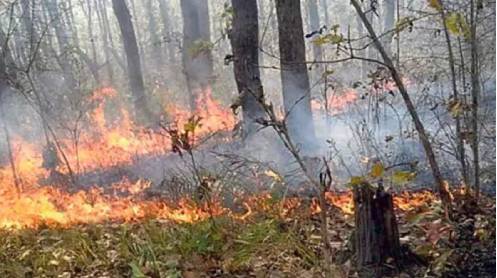Balochistan faces a significant environmental threat as its ancient forests transform due to human greed. The province boasts numerous renowned historic forests, including wild olive trees in the mountainous regions. The mild climate supports the growth of valuable trees, such as wild olives, juniper, and palos, offering various benefits. The oils extracted from these trees serve both culinary and medicinal purposes, and their environmentally friendly nature contributes to their significance.
Historically, these forests have played a crucial role in preventing natural disasters and maintaining ecological balance. Unfortunately, the changing landscape in Balochistan poses a serious threat to these vital ecosystems. In the upper regions, inhabitants, driven by severe cold conditions, resort to cutting down historical trees for various purposes, including fuel and income generation.
Individuals like Jan Muhammad from Moolah, Khuzdar, engage in woodcutting activities to supplement their livelihoods. The demand for wood increases in winter, as people in many areas of Balochistan use it for heating due to the unavailability or high cost of gas. The cutting of trees in winter is a common practice to meet the demand, and a chain of woodcutting is observed in hilly areas, where forest or mountain owners hire woodcutters annually.
Despite the ecological importance of these forests, there is a lack of government intervention to address the issue. Firewood is openly sold in Quetta, the provincial capital, contributing to the depletion of forests. Timber markets in cities like Khuzdar witness the sale of dry wood from various tree species, highlighting the ongoing exploitation.
While official forest data is scarce in Balochistan, research indicates the province’s vast potential for diverse flora and fauna. The neglected forests and animal sanctuaries require urgent attention from the government to prevent further depletion. According to the World Bank’s Green Pakistan Forests report, Balochistan has lost significant tree cover, leading to adverse environmental impacts and contributing to carbon dioxide emissions.
Rapid environmental changes, including deforestation, have severe consequences for Balochistan. The province has experienced dangerous floods and droughts, attributed to these environmental shifts. Moreover, the region’s susceptibility to natural disasters, as indicated in the World Bank’s Climate Risk Country Profile Report, underscores the urgent need for conservation measures.
Balochistan’s unique climate, characterized by water scarcity, poses challenges for afforestation efforts. Unplanned urbanization exacerbates the situation, with urban expansion in Quetta, Gwadar, and Khuzdar leading to the destruction of forests. Illegal logging of centuries-old trees by organized crime syndicates, often with local support, further intensifies the environmental crisis.
The province’s reliance on agriculture, coupled with a lack of awareness and poverty, has led to the conversion of fertile lands from forests to agriculture, accelerating deforestation. Immediate attention and strict policies are necessary to address the multifaceted challenges facing Balochistan, safeguarding its ecosystems and mitigating the impacts of climate change.







